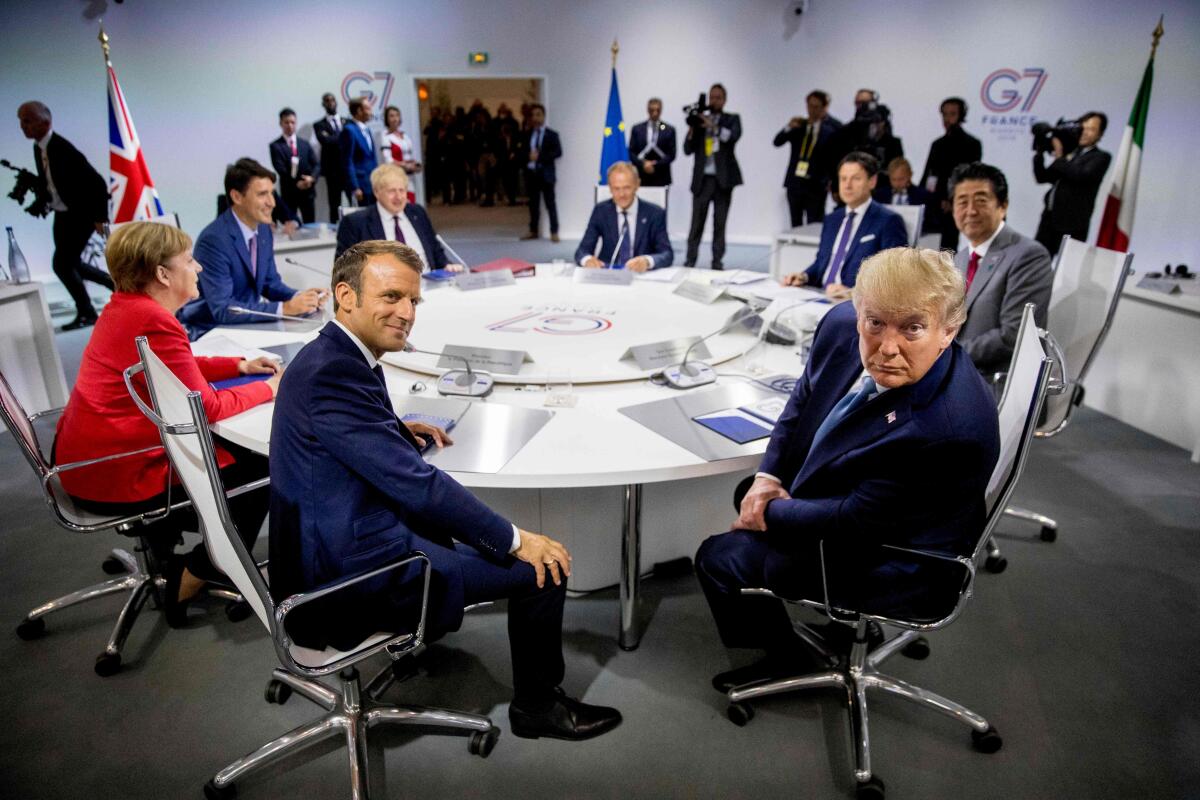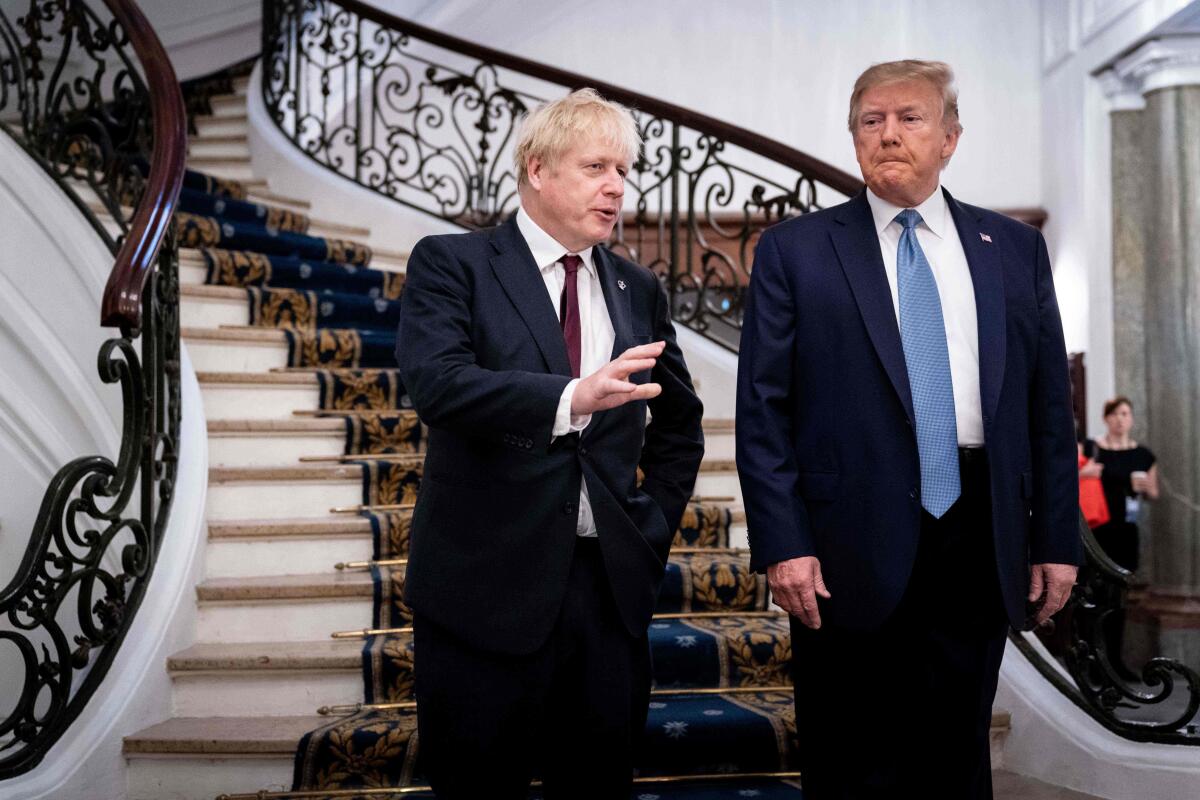Doubts over China trade war and rifts over Iran dominate G7 summit of world leaders

BIARRITZ, France — Mixed signals over the trade war with China and rifts over Iran dominated the opening of the annual G7 summit of the leaders of the world’s most powerful democracies as White House officials scrambled Sunday to sweep up after President Trump’s remark that he had second thoughts over his trade policy and debated how to respond to the unexpected arrival of Tehran’s foreign minister.
French President Emmanuel Macron, determined as this year’s host not to allow Trump to hijack the G7 agenda, quietly invited Mohammad Javad Zarif, Iran’s lead negotiator on the nuclear deal that Trump has tried to scuttle, to visit the beachfront resort in western France where world leaders are holding their annual meeting.
The move seemed to come as a surprise to Trump, whose administration has been intent on isolating Iran and who hates to share the limelight.
Trump was touting a tentative U.S.-Japan trade agreement when Zarif’s plane was landing nearby and appeared taken aback by news of his arrival.
“No comment,” he said curtly when first asked about Zarif on Sunday afternoon.
Macron and Zarif met later in the day.
Trump has expressed frustration over pre-summit media reports focusing on his status as an outlier among G7 allies on numerous issues.
Those differences were serious enough that in planning the summit, Macron jettisoned plans for a traditional joint statement from the seven leaders, acknowledging that getting all of them on the same page as Trump would be difficult, if not impossible.
But throughout the first day of summit meetings, Trump seemed determined to portray himself as in sync with other leaders despite much evidence to the contrary.
He proclaimed a lunch on Saturday with Macron, who unexpectedly greeted Trump at his hotel, to have been the best time the two leaders had spent together. His account contrasted with the private comments of his aides, who grumbled that the issues the French chose to highlight, including discussions about climate change and African development, didn’t focus enough on Trump’s favored issue, international trade.
And on numerous occasions, Trump asserted that he was in alignment with allies on contentious topics, even though their remarks brought nagging differences into ever starker relief.
Relations with Iran have been among the clearest differences: Trump pulled the U.S. out of the deal that limited Iran’s nuclear program and has sought to isolate Tehran. European leaders and Japan have tried to maintain ties with Iran and have sought to keep the nuclear pact alive.
At a dinner Saturday evening, Macron asked for support from the other leaders to make overtures on their behalf to Iran. Trump made clear Sunday morning that his support for such negotiations was tepid at best.
“We’ll do our own outreach,” he said. “But you can’t stop people from talking. If they want to talk, they can talk.”
Zarif’s presence was sure to focus a spotlight on the disagreements over Iran policy. The French insisted the other leaders were informed that the Iranian diplomat was heading to Biarritz, but a senior U.S. administration official, speaking on the condition of anonymity, said that wasn’t the case.
Trump, who has expressed a willingness to meet with Iranian leaders without preconditions but has sanctioned top officials, including Zarif, kept any frustration over the unanticipated guest to himself, avoiding the subject as he sent out a number of tweets from his hotel room before a dinner with other leaders.
By contrast, he had been eager to tout the possible breakthrough with Japan -- an agreement principle on a trade deal -- announcing the progress hours after a morning meeting with Japanese Prime Minister Shinzo Abe.
“We’ve been working on a deal with Japan for a long time. And we’ve agreed in principle,” Trump told members of the press pool covering his events, who were suddenly summoned to hear from him and Abe.
The Japanese described the deal more cautiously.
“We still have some remaining work that has to be done at the working level,” Abe said, but he confirmed that his country planned to increase its purchases of U.S. corn.
Both countries said they hoped to finalize the trade agreement by next month’s United Nations General Assembly in New York.
The announcement appeared to have been hurriedly put together as administration officials tried to squelch headlines about Trump’s apparent doubts over the latest escalation of his yearlong trade war with Beijing, which has unsettled global markets and U.S. business leaders and caused discord among key allies.
Asked by reporters Sunday morning if he had second thoughts about the trade war, Trump answered in the affirmative, a surprising statement from a president who has appeared allergic to self-doubt. Reporters asked a second time to ensure that Trump had heard the question correctly.
“Yeah, sure, why not?” he responded. “Might as well. Might as well. I have second thoughts about everything.”
Trump went on to say that he had “no plans” for now to declare a national economic emergency that might allow him to punish U.S. companies that ignore his demand that they stop doing business in China. He also said he hadn’t ruled out doing so if the situation deteriorated further.
On Friday, in a belligerent series of tweets that caused the stock market to nosedive, Trump “ordered” U.S. companies to start pulling operations out of China.
“If I want, I could declare a national emergency,” he said Sunday. “I think when they steal and take out intellectual property theft — anywhere from $300 billion to $500 billion a year — and when we have a total loss of almost a trillion dollars a year, for many years this has been going on. And in many ways that’s an emergency.”
Trump added: “Actually we’re getting along very well with China right now. We’re talking. I think they want to make a deal much more than I do.”
White House officials quickly tried to walk back Trump’s comment on having “second thoughts.” Press Secretary Stephanie Grisham said in a statement that Trump’s answer had been “greatly misinterpreted.”
“President Trump responded in the affirmative — because he regrets not raising the tariffs higher,” she said.
Larry Kudlow, a top economic advisor, offered a different explanation in an interview with CBS News. “He didn’t quite hear the question this morning,” Kudlow said, even though the president was asked twice.

Trump’s remarks about “second guessing” his trade war with China came during a breakfast meeting with new British Prime Minister Boris Johnson, their first since Johnson’s election as prime minister in July.
Trump praised the pro-Brexit leader as “the right man for the job” of finally engineering the U.K.’s separation from the European Union.
“I’ve been saying that for a long time,” Trump said of Johnson, before a dig at former Prime Minster Theresa May. “Didn’t make your predecessor very happy, but I’ve been saying that for a long time.”
The two men also expressed confidence about a U.S.-U.K. trade deal coming together in the near future. But in a sign that Trump’s policies have rattled even his closest allies on the world stage, Johnson gently expressed concerns about rising tariffs.
“Just to register the sheep-like note of our view on the trade war: We’re in favor of trade peace on the whole,” Johnson said. “We think that, on the whole, the U.K. has profited massively in the last 200 years from free trade, and that’s what we want to see. So, that’s what we’re keen to see. We don’t like tariffs on the whole.”
Another disagreement got attention later in the day when Trump and Abe showed they were out of sync on North Korea’s continuing missile tests, their words about the matter undermining the president’s claim that the two would always “be on the same page.”
Abe called the recent tests a clear violation of U.N. resolutions, but Trump wouldn’t go as far despite saying he was “not happy.”
“I can understand how the prime minister of Japan feels,” he said of short-range missiles that can’t reach the United States but threaten Japan. North Korean leader Kim Jong Un had made a “personal” commitment to him not to test long-range missiles that potentially could hit the U.S. but hadn’t said anything about short-range, Trump said.
“A lot of people are testing those missiles; not just him,” Trump said. “A lot of people are testing those missiles. We’re in the world of missiles, folks, whether you like it or not.”
Trump has also pushed to re-admit Russia into the annual summit, turning the G7 back into the G8. Russia was kicked out in 2014 after its military took over Crimea, which was part of Ukraine.
“We have a number of people who would like to see Russia back,” he said during the meeting with Abe. “I think it would be advantageous to many things in the world, I think it would be a positive. Other people agree with me, and it’s something that we’re discussing.”
Trump, however, seemed to inch away from his original push — “maybe we’ll just leave it the way it is,” he said — and he declined to say which other leaders agreed with him. Several European leaders have publicly opposed the idea, and none has publicly supported it.
“I could, but I don’t think it’s necessary,” he told reporters.
In Trump’s eyes, however, the media were to blame for focusing on tensions with other world leaders.
“Such False and Inaccurate reporting thus far on the G-7,” he tweeted early in the day. “The Fake News knows this but they can’t help themselves!”
As the day wound toward a close, Trump returned to that theme, tweeting, implausibly, that other world leaders had commiserated with him over the tone of his press coverage.
“The question I was asked most today by fellow World Leaders, who think the USA is doing so well and is stronger than ever before, happens to be, ‘Mr. President, why does the American media hate your Country so much? Why are they rooting for it to fail?’” he wrote.
Stokols reported from Biarritz, France, and Megerian from Washington.
More to Read
Get the L.A. Times Politics newsletter
Deeply reported insights into legislation, politics and policy from Sacramento, Washington and beyond. In your inbox three times per week.
You may occasionally receive promotional content from the Los Angeles Times.












